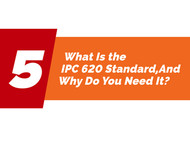What Is the IPC 620 Standard, And Why Do You Need It?
Posted by Staff - Soldertraining on 24th Mar 2022
The IPC/WHMA-A-620 is a quality standard identifying the "Requirements and Acceptance for Cable/Wire Harness Assemblies." The standard describes the materials, methods, tests, and acceptability criteria to produce quality crimped, mechanically secured, and soldered interconnections. IPC 620 standard was initially released in the year 2002 and has gained prominence as an important process, materials, and inspections standard.
IPC WHMA 620 Standard released its standard Revision C in January 2017. It is the only industry-consensus standard for custom cable assembly and wire harnessing. It addresses more than 375 documented comments and removes the "target condition" from the entire standard. The revision is 428 pages long. We can help you navigate through the standard to boost your understanding and enable you to adapt it to standardize the assembly and production requirements in the electronics industry. Obtaining appropriate training can help you improve the bottom line to:
- Promote operation standardization and compliance, and achieve excellence in processes within the concerned industry.
- Deliver on customers' requirements and strive to exceed their expectations. Enable customers to gain confidence in your services by releasing reliable and quality products.
- Deploy a 'common language' and facilitate cross-channel communication between various entities involved. Work together efficiently to fulfill the common aim of producing the best quality products.
- Gain the required skills, knowledge, and understanding to streamline processes, minimize waste production, and eliminate errors.
- Reduce the requirement for secondary processes, and ensure consistency and accuracy in soldered interconnections to enable the electronic product to work optimally.
We can support answers to your questions on the IPC-A-620 standard to help you excel in this domain. Contact us to align your practices with the IPC WHMA 620 Standard effectively!


